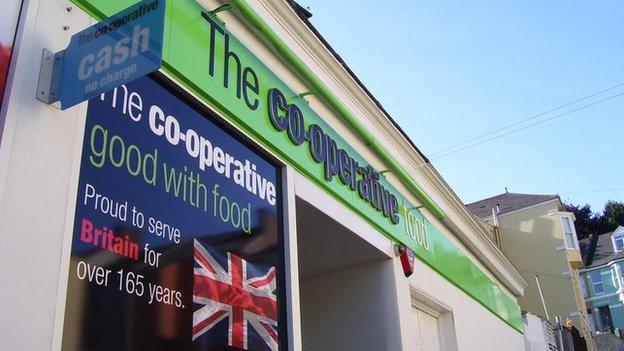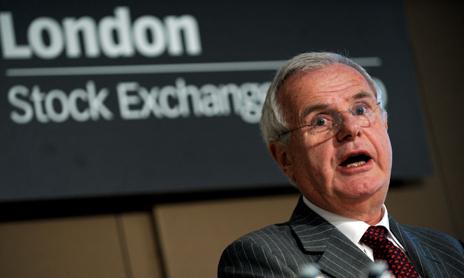Why Co-op's woes are deepening
- Published
- comments

Sent on 7 March, the covering letter from the Midcounties Co-operative, was suitably polite. "If you would like further information on the points raised, please let me know."
The letter was to Lord Myners, the former city minister charged with coming up with a plan to overhaul Co-op Group. With the letter was Midcounties' submission to Lord Myners' review.
In forensic detail the submission picks apart the main arguments contained in the initial plans for change. It is also provides stark evidence that here is an organisation that agrees it needs to reform - it just doesn't agree how.
Patrick Gray, president of Midcounties: We will not be "pushed into a corner"
"In recent years Midcounties has observed a failure at the most senior levels in the Group . . . to consistently reflect co-operative values and principles and the best standards of good governance and transparency," says the submission, which I have seen.
"This was not just a matter of errors of judgement over particular business decisions but also, more crucially, of a fundamentally flawed vision of the future of the movement which led to risk taking of a kind which was inappropriate and unnecessary in the context of co-operative ownership."
Midcounties is an important player in this game, the largest of the Co-op's independent societies with revenues of £1.2bn and more than 10,000 employees. The dozen independent societies across the UK have more than 20% of the voting rights on the group board and five are represented at group level. What they say matters for the future of the Co-op.
The background, as we know, is grim. As my colleague Robert Peston revealed last February Co-op Group is likely to report losses of up to £2bn when it reveals its 2013 figures next week.
The supermarkets, pharmacies and funerals business needs to change its model to survive. Many criticise a byzantine governance structure which critics say rewards longevity, skill at internal politics and willingness to attend endless committee meetings, above managerial skills.
Over the last decade, Co-op expanded rapidly, buying Somerfield supermarkets and the Britannia building society. Its structure simply couldn't cope.
Lord Myners - a non-executive board member of Co-op Group - is now on a listening tour, refining his initial proposals which focus on bringing in outside directors and giving the Co-op some of the checks and balances more akin to a publicly listed company. As The Guardian reports this morning, external, Midcounties has already voted against the reforms, with its president, Patrick Gray, saying that they will not support the "menu" that Lord Myners is offering.

Lord Myners has several proposals for the future of Co-op Group
Mr Gray, whom I spoke to yesterday and who made an appearance on the Today programme and BBC Radio 5 live this morning, is most concerned that by changing the governance structure, the very democratic and "values-led" DNA of the present Co-op might be lost. Euan Sutherland, the former Co-op chief executive who resigned after details of his pay were leaked to The Observer, external, argued that democracy and values might be vital, but without radical change the whole future of the business was at risk.
This is a disagreement that goes to the heart of the Co-op debate. As its submission continues, "Midcounties does not share the view that in a co-operative context member control is incompatible with the needs of a complex commercial enterprise. Indeed, experience in the UK and abroad demonstrates that this is clearly not the case.
"Among the independent consumer co-operative societies, it is demonstrably the case that it is the most democratic that are the most successful in commercial terms, not the reverse."
The clash is one of cultures. Lord Myners is steeped in PLC history, having formerly been chairman of both the property business, Land Securities, and Marks and Spencer. Mr Sutherland was formerly at the retail giant, Kingfisher. Niall Booker, the chief executive of Co-op Bank in which the Co-op Group retains a 30% stake, is a veteran of HSBC.
They are coming up against committed independent heads of co-operative societies who have long experience of mutual operations. They are suspicious of where change is leading.
"A fundamental point is that the relationship [between Group and its Co-op members] is not purely commercial," the Midcounties submission says. "All societies are part of the co-operative movement.
"We share a common interest in showing that co-operation is a force for good in society and an important organisational model in itself."
Lord Myners has until a special general meeting of the Co-op Group in the summer to get his proposals agreed. He will have a tough job.
UPDATE 13:15
I'm hearing rumblings that the Treasury Select Committee is very keen to call Euan Sutherland to give evidence to its inquiry into the Co-op bank collapse and its impact on the Group's problems.
In what would be an incendiary hearing, MPs are particularly keen to ask the former chief executive exactly what he meant when he said that the business was "ungovernable" and why he left so abruptly. Mr Sutherland also questioned the viability of the 170-year-old organisation.
If it happens - and I believe it will - it will be standing room only.